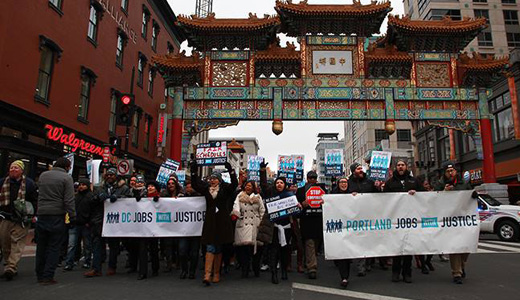
WASHINGTON. D.C. – “We are sick and tired of billionaires running our political system. We are sick and tired of what has become of our democracy,” Larry Cohen, the recently retired international president of the 600,000 member Communication Workers’ Union of America (CWA), told over 750 participants at the 2016 Jobs with Justice (JWJ) National Conference held February 12 and 13.
Cohen, who helped to found JWJ nearly 30 years ago, added that the trade union and community leaders assembled at the D.C. Hyatt Regency were helping to build a mass movement from the bottom up.
“The guts of what we do is direct action,” he added. “We are willing to act with our bodies, to take a stand and fight back.” Cohen’s energy and optimism for the emerging movement that is today challenging the corporate one percent were in evidence throughout the conference.
Tefere Gebre, executive vice president of the AFL-CIO, the nation’s largest labor federation, self-critically told the assembled activists, “We [organized labor] are not in a position to talk about race without cleaning our own house.”
Gebre, an Ethiopian immigrant, knows first-hand the challenges people of color face within organized labor and in the struggle for higher wages, better benefits and dignity and respect on the job. He urged participants to make “racial justice one of our key issues.”
Additionally, Gebre called for a new offensive within the house of labor. “We can’t continue politics as usual. We have to change the rules. We can’t let Wall Street write the rules. Their rules aren’t working for any of us.”
“We used to know how to change the rules,” he added, reminding participants of the historic Flint sit-down strike, which gave birth to the United Auto Workers’ (UAW) union and redefined labor-management relations for a generation – while ushering in an unprecedented era of union membership and activism.
He then connected that 1936 strike to the assault on the people of Flint today. He said the residents of Flint have “lost their democracy. This is what happens when the other side writes the rules.”
“This is the most ruthless environment for us to do our work in,” Esther Lopez, secretary-treasurer of the 1.3 million member United Food and Commercial Workers’ Union (UFCW), soberly said. Adding, “We define justice with every fight that we step into and every fight that we take on.”
The conference wasn’t all talk. Workshops on topics as diverse as the participants offered an array of opportunities for Black, white, young, old, LGBTQ and straight, to engage, build relationships and learn new skills.
For examples, there were workshops on Learning the Arts of Our Struggle, Organizing for Just Hours, Putting Our Values Into Action: Jobs with Justice and the Movement for Black Lives, Tools for Building Stronger Unions, The Face-Off: How to Handle Media Interviews, Bringing Global Bargaining Home: Connecting Organizing Around the World, and #Winning at Social Media in Order to Win Your Campaigns, among many others.
Additionally, towards the end of the first day conference participants marched to the D.C. Chamber of Commerce and the National Retail Association – temporarily occupying both buildings lobby’s – in support of local service workers demanding fair scheduling practices and full-time work.
During the opening plenary, Rasheen Aldridge, a former fast-food worker appointed to Missouri Governor Nixon’s Ferguson Commission after the murder of Mike Brown, told participants, “My voice matters and I’m going to let it be heard. I’m going to challenge power.”
Like thousands of young activists who converged on Ferguson last fall, Aldridge, 21, said his voice “exploded,” as he and others “stood up, organized and screamed ‘No justice, no peace’ and ‘Show me $15 and a union,'” thereby connecting the struggles for police accountability and workers’ rights.
“What happened in Ferguson and what happens at McDonald’s isn’t that different,” Aldridge concluded. “Racial and economic justice are connected.”
“The fight for $15 is a fight for dignity,” echoed Labor Secretary Thomas Perez, who stirred the Conference attendees to their feet multiple times. “This is not just a struggle for economic justice. It’s a struggle for racial justice,” as many low-wage service sector jobs are disproportionately held by people of color.
Additionally, Sec. Perez called on the collective power of the labor movement and its community allies to hold the United States to the highest standard of what it could be. “We can do better than this as a nation,” he implored. “The power of we, the power of workers standing together is a vital force today. Organize, mobilize, persist,” he concluded.
Sarita Gupta, executive director of Jobs with Justice, captured the sentiment of the National Conference when she said, “We firmly believe in the power of solidarity and the conviction that our struggles cannot be won separately. It’s not your fight. It’s not my fight. It’s our fight.”
Gupta emphasized the need to “shift power to workers” and “negotiate on-behalf of the collective good.” However, she added, “to re-write the rules, we need everyone at the table.”
Photo: Activists at the 2016 Jobs with Justice National Conference took to the streets of D.C. in support of fair hours and wages. | Jobs with Justice Facebook page












Comments